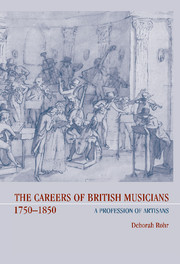Book contents
- Frontmatter
- Contents
- List of tables
- Acknowledgments
- List of abbreviations
- Introduction
- 1 The social and professional status of musicians in the eighteenth century
- 2 Social profile
- 3 Patronage
- 4 Musical education
- 5 Church musicians
- 6 Secular musicians: singers
- 7 Secular musicians: instrumentalists
- 8 Teachers, composers, and entrepreneurs
- 9 The fortunes of musicians
- 10 The struggle for social and professional status
- Epilogue
- Appendix
- Notes
- Bibliography
- Index
7 - Secular musicians: instrumentalists
Published online by Cambridge University Press: 20 October 2009
- Frontmatter
- Contents
- List of tables
- Acknowledgments
- List of abbreviations
- Introduction
- 1 The social and professional status of musicians in the eighteenth century
- 2 Social profile
- 3 Patronage
- 4 Musical education
- 5 Church musicians
- 6 Secular musicians: singers
- 7 Secular musicians: instrumentalists
- 8 Teachers, composers, and entrepreneurs
- 9 The fortunes of musicians
- 10 The struggle for social and professional status
- Epilogue
- Appendix
- Notes
- Bibliography
- Index
Summary
Instrumentalists commanded neither the high salaries of singers, the potential earnings of teachers, nor the respectability of organists. Their careers were associated with apprenticeship training, relatively poor earnings, and an artisanal social status. The plight, particularly of orchestral instrumentalists, inspired much comment in contemporary writings. One musician in 1822 blamed the aristocratic prejudices which had “given currency to the belief that an instrumentalist is a weak or unworthy member of society.” And twenty years later, an irate editorial in the Musical Examiner asked,
What would a concert be without the presence of these ill-requited labourers? … What would all the Rubinis, Grisis, and other such notables, in the universe be worth without the unacknowledged, but indispensable aid of that ill used, and almost despised body of musicians (necessarily, much more so than singers), at which vocalists and anythingists, so they be soloists, toss their heads, and turn up their noses? – Nothing … And yet this eminently useful body, in the absence of which, any musically inclined person would leave a concert room in less than five minutes after entering it, is looked down upon with almost contempt by vocalists, etc. who are only superior, inasmuch as they are better paid.
Table 13 presents the numbers of musicians employed in various categories of instrumental work. Note that only thirty-six (3.2 percent) of the instrumentalists in the catalogue were women.
- Type
- Chapter
- Information
- The Careers of British Musicians, 1750–1850A Profession of Artisans, pp. 113 - 133Publisher: Cambridge University PressPrint publication year: 2001



